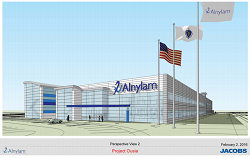 |
| A rendering of Alnylam's proposed plant--Courtesy of Alnylam |
Boston-area biotech Alnylam ($ALNY) has pledged to have three marketed products and 10 clinical-stage candidates by 2020. With its recent decision to build a plant in the area, it is taking steps to ensure it has its own manufacturing operation to produce them.
The company last week closed its deal to buy a 12-acre site in Norton, MA, which is about 40 miles south of Alnylam headquarters in Cambridge, the Boston Globe reported. Christine Regan Lindenboom, VP of investor relations and communications, said Wednesday that construction is slated to begin in April and the 130,000-square-foot plant should be operational by 2018.
Alnylam has told investors it expects to spend about $100 million on the facility this year but has indicated that the total investment could eventually reach up to $200 million. The facility is slated to have 150 workers when it opens but the company has pledged to hire a total of 220 in 5 years. The drugmaker is getting about $7 million in tax breaks from the city.
 |
| Christine Lindenboom, Alnylam VP of investor relations and communications |
"The plant initially will manufacture substance for clinical studies and if all goes well with the regulatory process, it will then manufacture for commercial use as well," Lindenboom said. "It is an important step forward in our path to commercialize our products."
Alnylam's lead drug is patisiran, a treatment for transthyretin-mediated amyloidosis, or ATTR, in patients with familial amyloidotic polyneuropathy (FAP), a rare genetic defect that can lead to deadly protein buildups that damage nerve tissue. Alnylam's therapy targets the disease through RNA interference (RNAi), which would silence disease-causing genes by interfering with the body's natural messaging systems. The company is partnered with Sanofi's ($SNY) Genzyme, which took a stake in Alnylam in 2014.
Because of the nature of Alnylam's therapy, Lindenboom said the plant will differ from traditional biologics manufacturing plants. "It is a synthetic processing that requires a lot of additional purification," she said. "The facility will be unique to the industry."
Lindenboom emphasized that Alnylam could have built the plant anywhere in the world, but is committed to growing in Massachusetts. "We were founded in Massachusetts. Our headquarters is in Cambridge. This is another important commitment to our presence in Massachusetts," she said.
- here's the Boston Globe story